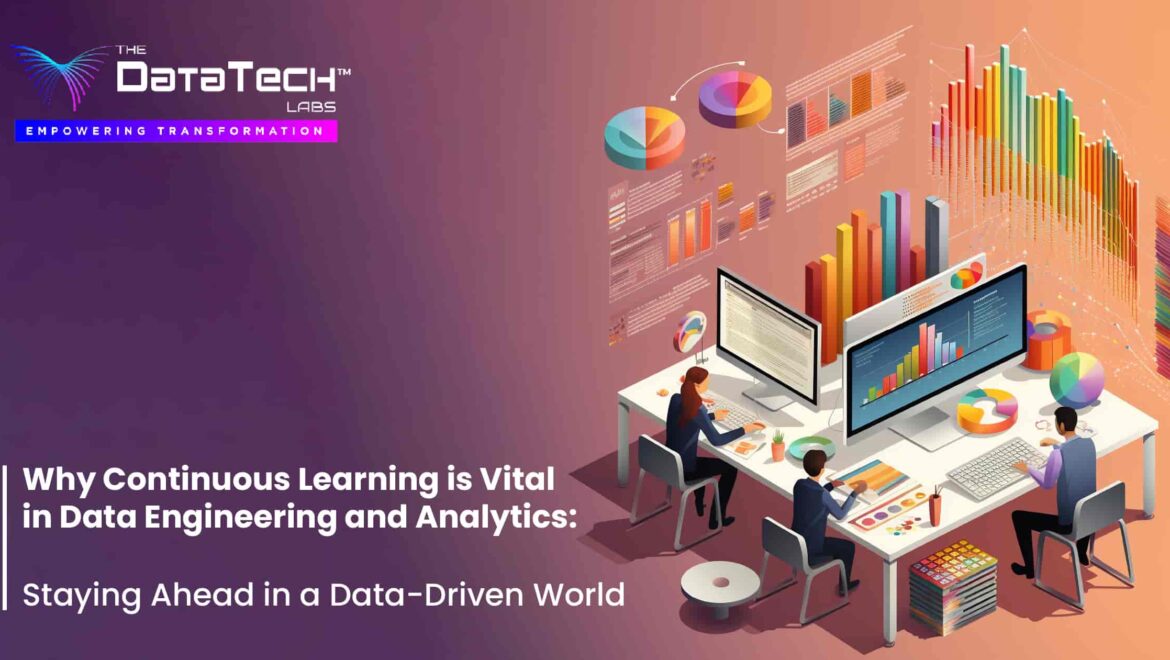Introduction
The Rapid Evolution of Data Engineering and Analytics
In recent years, the fields of data engineering and analytics have undergone tremendous growth. This rapid evolution is driven by the increasing reliance on data to make informed decisions, optimize operations, and create innovative solutions across industries. As technology advances at an unprecedented pace, professionals in these fields must continuously update their skills and knowledge to remain effective and competitive.
The Role of Continuous Learning in Professional Development
Continuous learning is not just a buzzword; it’s a critical component of professional growth. For data engineers and analysts, staying ahead of the curve means engaging in lifelong learning to adapt to new tools, techniques, and methodologies. This commitment to learning not only enhances career prospects but also ensures the ability to tackle complex data challenges effectively.
The Importance of Continuous Learning
Adapting to Technological Advancements
The landscape of data engineering and analytics is constantly changing with the introduction of new technologies. From big data frameworks like Hadoop and Spark to advancements in machine learning and artificial intelligence, the need to stay current is paramount. Continuous learning enables professionals to understand and implement these technologies, ensuring they can leverage the latest tools to drive innovation and efficiency.
Enhancing Analytical Skills
Advanced analytical techniques are crucial for extracting meaningful insights from data. Continuous learning helps professionals stay proficient in these techniques, allowing them to refine their skills and stay adept at interpreting complex data sets. Mastering new methods, such as deep learning algorithms or advanced statistical models, can significantly enhance analytical capabilities.
Improving Problem-Solving Capabilities
In the realm of data engineering and analytics, challenges are inevitable. Continuous learning equips professionals with a diverse set of problem-solving tools and approaches. By staying informed about the latest research and case studies, data engineers and analysts can develop innovative solutions to overcome obstacles and optimize outcomes.
Staying Competitive in the Job Market
The job market for data professionals is highly competitive. Employers seek individuals who not only have the requisite technical skills but also demonstrate a commitment to continuous improvement. By engaging in continuous learning, professionals can differentiate themselves, making them more attractive candidates for top positions and increasing their job security.
Key Areas for Continuous Learning in Data Engineering and Analytics
Data Management and Governance
Effective data management and governance are essential for ensuring data integrity, security, and compliance. Continuous learning in this area involves staying updated on best practices, regulatory requirements, and the latest tools and technologies that support efficient data management.
Big Data Technologies
Big data technologies like Hadoop, Spark, and other frameworks are foundational to handling large volumes of data. Keeping up with advancements in these technologies through continuous learning ensures that data professionals can process and analyze data more effectively.
Machine Learning and Artificial Intelligence
Machine learning (ML) and artificial intelligence (AI) are revolutionizing data analytics. Continuous learning in these areas involves understanding new algorithms, techniques, and applications. Resources such as online courses, certifications, and workshops can help professionals stay proficient in ML and AI.
Cloud Computing and Data Storage Solutions
Cloud computing platforms such as AWS, Azure, and Google Cloud offer scalable and flexible data storage and processing solutions. Continuous learning about these platforms, including earning cloud certifications, can provide significant advantages in managing and analyzing data efficiently.
Data Visualization and Reporting Tools
The ability to present data insights clearly and effectively is crucial. Tools like Tableau and Power BI are popular for data visualization and reporting. Continuous learning in this area includes mastering these tools and understanding best practices in data storytelling.
Strategies for Effective Continuous Learning
Formal Education and Certification Programs
Formal education programs and certifications from reputable institutions can provide a structured path for continuous learning. Programs such as data science degrees or certifications from organizations like IBM and Google offer comprehensive training and industry-recognized credentials.
Online Courses and MOOCs
Massive Open Online Courses (MOOCs) from platforms like Coursera, edX, and Udacity offer flexible learning options. These courses cover a wide range of topics and can be an effective way to stay updated on the latest trends and technologies in data engineering and analytics.
Professional Development Workshops and Conferences
Attending workshops and conferences provides opportunities for hands-on learning and networking with industry experts. Events such as the Strata Data Conference and the International Conference on Data Science and Advanced Analytics are valuable for professional development.
Reading Industry Publications and Blogs
Staying informed through industry publications, journals, and blogs is essential. Resources such as the Journal of Big Data, KDnuggets, and Towards Data Science provide insights into the latest research, trends, and best practices.
Participating in Professional Communities and Forums
Engaging with professional communities and forums, such as Reddit’s r/datascience or LinkedIn groups, fosters knowledge sharing and collaboration. These platforms allow professionals to discuss challenges, share resources, and stay connected with peers.
Balancing Continuous Learning with Work and Life
Time Management Tips for Busy Professionals
Balancing continuous learning with work and personal life can be challenging. Effective time management techniques, such as setting aside dedicated learning time, prioritizing tasks, and breaking learning goals into manageable chunks, can help professionals integrate learning into their busy schedules.
Leveraging Employer-Sponsored Learning Opportunities
Many employers offer learning and development programs, including funding for courses and certifications. Taking advantage of these opportunities can reduce the financial burden and provide structured support for continuous learning.
Self-Motivation and Goal Setting
Setting realistic learning goals and tracking progress can help maintain motivation. Techniques such as creating a learning roadmap, rewarding achievements, and seeking support from mentors can enhance the continuous learning journey.
Conclusion
The Future of Data Engineering and Analytics
The future of data engineering and analytics is promising, with continuous advancements and increasing reliance on data-driven decision-making. Professionals who embrace continuous learning will be well-positioned to take advantage of these opportunities and drive innovation in their fields.
Final Thoughts on Lifelong Learning
Lifelong learning is not just a career strategy but a mindset that fosters growth and adaptability. By committing to continuous education, data engineers and analysts can stay ahead in a data-driven world, ensuring long-term success and fulfillment in their careers.
FAQ's
The most valuable certification can vary based on career goals, but popular ones include the Certified Data Professional (CDP), Google Professional Data Engineer, and AWS Certified Big Data – Specialty.
Staying updated involves reading industry publications, attending conferences, participating in webinars, and engaging with professional communities.
Resources such as Tableau’s online training, Power BI community forums, and books like “Storytelling with Data” by Cole Nussbaumer Knaflic are excellent for learning data visualization techniques.
Consider factors such as course content, instructor expertise, platform reputation, and user reviews when choosing an online learning platform. Free trials or introductory courses can also help in making an informed decision.
Yes, continuous learning is essential for career growth. It keeps skills current, opens up new career opportunities, and demonstrates a commitment to professional development, making individuals more competitive in the job market.




